Open Doors

SPOTLIGHT ON. KEHELLAND
Growing confidence and skills in Camborne
ON THE BUSES
Learn how travel training is transforming lives
ACCESS ALL AREAS
Out and about with the Access Cornwall audit team


Growing confidence and skills in Camborne
Learn how travel training is transforming lives
Out and about with the Access Cornwall audit team
Welcome to Issue 2 of Open Doors magazine. Our magazine is created by and for students all around Cornwall who have Special Educational Needs and/or Disabilities (SEND), and/ or autism spectrum diagnoses, and our mission is to share inspiring stories and ideas about career and work experience opportunities.
In this issue some of our original students have returned to help us and we are joined by new learners. We were delighted to visit and explore the beautiful grounds of the Kehelland Trust where students are gaining valuable skills to help them enjoy work and independence. We also learned how students at Poltair School have enjoyed some fantastic work safaris, including trips to the Royal Cornwall Hospital, National Maritime Museum Cornwall as well as some bus driving and first aid lessons.
In our article ‘Jobs we’d love to do’ we are also showcasing some illustrations and articles from students that demonstrate their talents and interests, ranging from computer games, to artwork and dance. Learners have also joined us at Access Cornwall on our new weekly radio show as well as being trained in accessibility audit skills which they have demonstrated at Penlee House Gallery and Museum. You can also learn more about the Youth Employment Project run by Cornwall Council from a young person who has gained valuable skills and experience from the programme.
We hope this magazine gives you ideas for engaging and inspiring work experience opportunities as well as potential career paths. Again we thank Cornwall Council for funding this magazine and hope to see you soon in Issue 3 which will be published in April 2025.
Thank you for taking the time to read this magazine. If you have any questions you can get in touch with the editorial team at hello@accesscornwall.org.uk
Produced by Access Cornwall CIC. With thanks to Cornwall Council who have funded this project.




This magazine has been inspired and co-created by a team of students with an array of talents and who also have experience of Special Educational Needs and/or Disabilities. Our aim is to offer employers information and help directly from those young people who are seeking to find work opportunities in Cornwall.
The project has been funded by Cornwall Council.
Thank you for supporting this magazine. You can find out more about the team and the project at hello@accesscornwall.org.uk
Design & illustrations
Hope, Liskeard School
Max, Nancealverne School
Editorial
Hope, Liskeard School
Jaden, Liskeard School
Quinn, Liskeard School
Willow, Liskeard School
Polly, Liskeard School
Jack, Kehelland College
Ashlee, Kehelland College
Harvey, Kehelland College
Aaron, Kehelland College
Henry, Kehelland College
George, Kehelland College
Callum, Poltair School
Mason, Poltair School
Liam, Poltair School
Matthew, Poltair School
Caprice, Poltair School
Damian, Poltair School
Toby, Poltair School
Lucas, Nancealverne School
Alfie, Nancealverne School
Photography
Hope, Liskeard School
Willow, Liskeard School
Polly, Liskeard School
Callum, Poltair School
Liam, Poltair School
Damian, Poltair School
Toby. Poltair School
Lucas, Nancealverne School
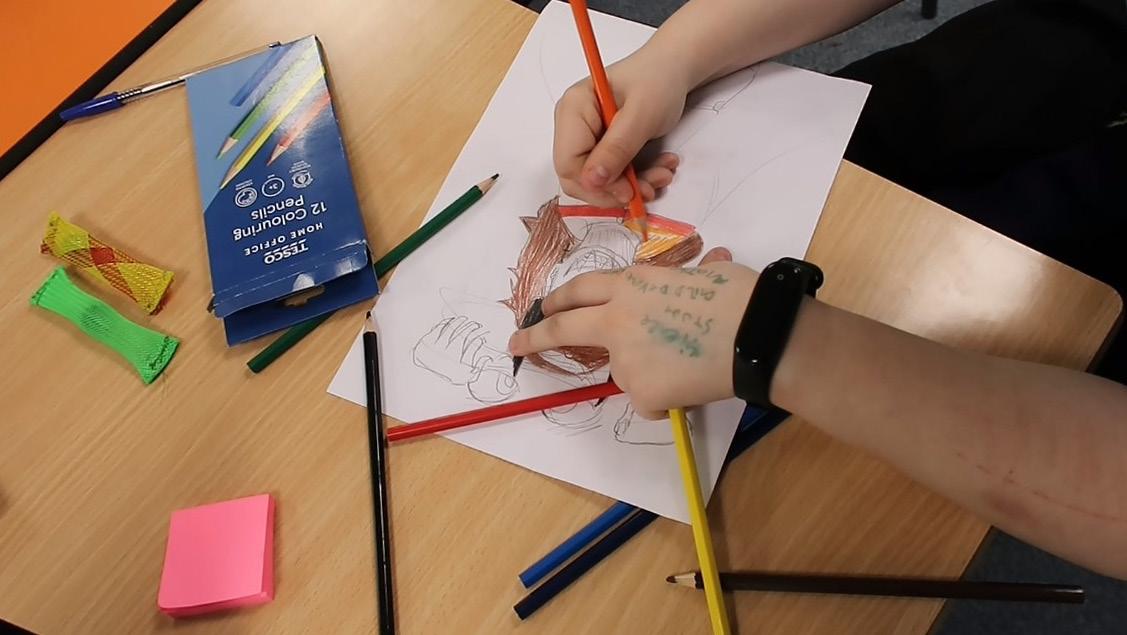




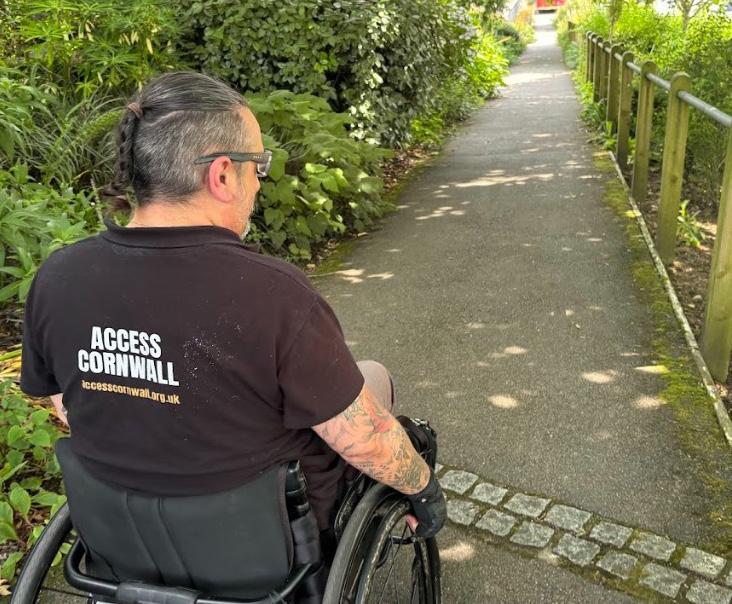

A fantastic new opportunity is available for young people in mid Cornwall through School of Dough CIC. From 14th November they are running a Community Cooking - Kids & Youth Club Session running on most Thursdays at ClayTAWC in St Dennis between 5.30pm and 7pm. School of Dough inspires a love of cooking amazing streetfood as well as offering inspiration to up and coming entrepreneurs, supporting food skills and finance skills. Find out more on their Facebook page: www.facebook.com/FrancSchoolofDough
Free toolkits for young autistic people transitioning into work
Moving into college, university or a new job can be daunting for young people who are autistic. Ambitious about Autism have prepared some helpful toolkits, including this one to help prepare you for successful careers guidance sessions and work experience placements.
Click here for more information: www.ambitiousaboutautism.org.uk/what-we-do/ employment/toolkits/toolkit-for-young-people
Would you like a work placement to help you gain valuable skills?
If you’re aged 16-24 with an Education, Health and Care Plan, a Supported Internship can help you get into work. You’ll learn the skills you need for work, while spending most of your time in a real workplace. You can also study for qualifications, like English and Maths.
A Job Coach works with you and your employer throughout the 6 to 12 month Internship to help you to work out tasks and learn new skills. The roles are unpaid and the aim is to help you into paid work when your internship is finished.
There are lots of different jobs available in different sectors including healthcare, gardening, hospitality and retail.
To find out more, email us at ebp@cornwall.gov.uk
The Cornwall & Isles of Scilly Careers Hub are hosting their third annual ‘Careers Summit’ bringing people from education, the business community, training providers and around 150 young people together to share good practice, encourage collaboration, outline future plans and celebrate success. Book your place here: careershubcios.co.uk/events/careers-hub-summit-eden-project/

If you are interested in working in hospitality, Work Your Way are holding a Taster Day for their Supported Internships from 10am to 1pm on 14th November at Gwel an Mor near Portreath.
Join them for a morning of team building skills and identifying individual strengths
To book your place email martin.prodger@cornwallrcc.org.uk or call 07732 604467



The Access Cornwall team have been out and about carrying out accessibility audits all around Cornwall over the last 6 months thanks to funding by the UK Government through the UK Shared Prosperity Fund. We are currently supporting volunteers and work experience students who would like the opportunity to come out on audits and learn new skills. Recent audits have taken place at some amazing locations including Tate St Ives, the Minack Theatre and Paradise Park wildlife sanctuary. If you would like work experience on our accessibility audits please email us at hello@accesscornwall.org.uk
Cornwall Council has been chosen by Government as a Lead Authority for the fund and is responsible for monitoring the progress of projects funded through the UK Shared Prosperity Fund in Cornwall and the Isles of Scilly.
Would you like work experience producing the next issue of this magazine?
If you would like to get involved in producing Issue 3 of Open Doors magazine, the opportunity is open to all SEND students around Cornwall who have an EHCP and are aged 16 to 25. You can be a school or an individual student, and we support those who are home schooled as well as students who are in mainstream education.
Please get in touch by emailing us here at hello@accesscornwall.org.uk to register your interest.


As term ended at Poltair School in St Austell, some of the students were heading out to work.
Students had a busy week travelling by bus and train to find out more about a range of different jobs they might like to try.
Here’s the diary of Poltair School’s Work Experience Week…
Monday 22nd July
Royal Cornwall Hospital Trust, Truro
We met with the head of volunteer services and also staff who work in the sterilisation unit. This is a really important job, making sure that all the instruments and items used to operate on patients and care for them are perfectly clean and free from germs. If so much as a door is opened during the process then all the items have to be sterilised again!
How we got there: We decided to take the bus on this day because the train station was 30 to 40 minute uphill walk from the Royal Cornwall Hospital and one of our classmates would have struggled to get there this way.
What we loved: It was really interesting to hear about the different jobs at the hospital.
We decided we wouldn’t really want a job that was indoors all the time and that is definitely the case if you work in the sterilisation unit!
Tuesday 23rd July
National Maritime Museum Cornwall, Falmouth
Here we met with the lead curator who told us all about the museum and the different jobs that you can do there. The museum also has lots of volunteers who help with displays and showing people around the museum.
How we got there: We got the train from St Austell to Truro and then to Falmouth Town. The museum is a short walk from the station.
What we loved: We especially loved the room where there is a window that looks out under the sea when the tide comes in. There were lots of interesting jobs here.
It seems like an interesting job to drive buses, but very hard work.
Wednesday 24th July
Plymouth City Bus depot
Charlie, who had met us at Truro bus depot at last year’s travel training, met us here. We saw lots of different buses, including older vintage buses, we also all got the chance to sit in the driver’s seat of a bus and sound the horn. It seems like an interesting job to drive buses, but very hard work.
How we got there: We got the train from St Austell to Plymouth.
What we loved: This was our favourite day, we got to ride around Plymouth in an opentop bus!



Thursday 25th July
Aid
We got to do a bit of First Aid training in the morning, and learned how to do mouth to mouth resuscitation and CPR on test dummies.In the afternoon we helped write this article about our week, picked out photos and took some of our work experience packs.
How we got there: The training happened at school on this day.
What we loved: We found out how to work the defibrillators, which is helpful as we have a couple in school and that could save someone’s life one day.
Friday 26th July
Newquay Orchard.
We finished the week visiting Newquay Orchard and having an ice cream in the sun!


Poltair school and students would like to thank all the companies who hosted them throughout the week as well as Catherine Andrews and Janine Bisson who, without their support the week would not have been possible.
• Photography - Liam, Damian, Callum, and Toby
• With thanks to the students who contributed to the interview - Callum, Mason, Liam, Matthew, Caprice, Damian, and Toby.

SEND students around Cornwall have been discovering new freedom and independence as a result of travel training…
Cornwall is a very beautiful place but it’s also very difficult to get around if you don’t drive a car. Catching buses and trains can be particularly daunting for SEND students as they navigate different timetables and the different ways you plan journeys and buy tickets on public transport.
That’s why travel training can be incredibly helpful.
Over the last two years a partnership project in travel training has been run thanks to a collaboration between the Cornwall and Isles of Scilly Careers Hub, Cornwall Council’s Transport Coordination Service (TCS) and Transport for Cornwall.
Travel Training gives people with special educational needs or disabilities the confidence and skills to travel independently on buses and trains. The Cornish project has been combining travel training with guided tours of college campuses and workplaces.
This valuable life skill not only opens up more career opportunities, but allows young people who don’t have access to a car to enjoy a more independent life with more opportunities to go to social events and activities they enjoy.
Travel training covers the following areas:
9 Builds confidence in using local buses or trains
9 Understanding how to keep yourself safe
9 How to use timetables and buy tickets
9 Road safety, when waiting for buses and walking to and from bus stops
9 What to do when things go wrong (e.g. the bus is late)
9 How to use helpful technology such as apps that give live travel updates
Jenni Parrish, post 16 Class Teacher who supported travel training for students at Curnow school in Redruth explained how well it can work:
“The whole travel training was very positive. Students were treated with respect and kindness by all they met at the destinations and the bus drivers. It was also a great learning experience with managing different situations of rowdy students, busy buses and chatting to people they didn’t know. They learned to be patient waiting for buses, and they also showed flexibility when things didn’t go according to plan and being okay with plan B.
The whole travel training was very positive.



“Students have learned the routine of waiting at the bus stop, to sit if possible, well away from the road to be safe and to be aware of others waiting for the bus especially those who might need to sit such as the elderly.
“Bus travel is now a viable option for our students: they are comfortable and confident to use the public transport with minimal support, they know the routine of catching a bus and the systems for buying tickets and stopping the bus when they want to get off. They are also aware that this is a cheap form of transport that can give them independence and an alternative for their families.”

This summer students at Poltair School in St Austell built travel training into their work experience week. Each morning students would be told where they were going to go and they worked as a team with teachers to decide which form of transport was best to use for their trip that day.
“On the day we went to the Royal Cornwall Hospital in Truro, we decided to use the bus because one of our classmates would have struggled with the 35 minute walk uphill from the train station and it is easier to get to the hospital from the bus stop than the train station for her,” says Callum from Poltair School. “But when we found out we

“I like buses,” says Jaden from Liskeard school. “I like the number 11, it goes to Plymouth bus station, I catch it in Liskeard. I like going over the bridge and I like seeing all the buses at the station.
“I want to be a bus driver, I will need to work hard and get my driving license. I can’t drive a bus until I’m 21 though. I will also need to get my Maths GCSE even though they use the ticket machines.”
were going to the National Maritime Museum Cornwall, we decided to go on the train because the train station is very near to the museum and we were able to change at Truro to get to Falmouth.”
Frankie Rigolli is the Enterprise Coordinator at Cornwall and Isles of Scilly Careers Hub who initiated and oversaw the travel training project.
“The whole idea was born from a few worrying statistics,” he said. “Schools were telling us that many of their students were picking their post-16 options based not so much their interests and aspirations, but on location. These decisions cause some issues and may affect future career options,” Frankie continued, “largely because the destination may not be right – it’s just closer to home.
“It is a challenging issue to overcome, but we didn’t want to ignore it, and so we contacted our colleagues in the Transport team and launched this pilot project.”
“The benefits are huge,” Frankie adds. “Suddenly you have independence. These young people are confident to visit family and friends under their own steam, explore job opportunities, gain life experiences.”
“These skills will ultimately transfer into later life and could open doors they never thought existed.”
Daniel Baker is the Transport Co-ordination & Eligibility Manager for Transport Coordination Service says: “It has been a pleasure to support the initial trial and to see first-hand the positive impact it has had on the young people who have taken part.”
“The feedback received from the young people involved has served to underline just how important this training is and why we must roll this out further so that others can benefit.”
In addition to being part of the editorial team creating Open Doors magazine, from August this year SEND students around Cornwall now also have the opportunity to be a part of the new Access Cornwall radio show that is being broadcast by the Community Hospitals Radio Network (CHBN) in Cornwall.
The new radio show which is aired every Sunday at 10am and every Friday at 12pm showcases the many accessible places and activities around Cornwall as well as featuring inspiring stories of people who live with disabilities and neurodivergence in the Duchy.
So far students from Nancealverne school in Penzance have featured in the show, sharing their experiences of training as Access Cornwall accessibility ambassadors and visiting Penlee House & Gardens and discovering the artworks and museum on display in the beautiful building in Penzance.
Students and teachers from Liskeard school have also contributed to the show, sharing their experiences of visiting the animal rescue charity HUGS Foundation that rescues ponies, horses and donkeys and their work supporting the Looe Valley Vineyard.
There are also plans for student trips to the new, hi tech CHBN studios base in the Royal Cornwall Hospital in Truro. “I’ve never been to a radio studio before,” says Lucas from Nancealverne school in Penzance. “I loved being on the radio show and I’m really looking forward to going to see the studio.”
If you would like to listen to the Access Cornwall show on CHBN radio you can find all the ways to tune in here, every Sunday at 10am: chbnradio.org/on-air/how-listen
To listen to previous shows, visit chbnradio.org/on-air/listen-again


Trinity shares her experiences of having support through Yep!
If you would like to find out more about Yep! you can visit Yep!CSW Group Ltd. or call 0800 97 55 111
I first got involved with Yep! after my mum heard about it and looked into it. I had to fill out a very simple form to join the project and within a few weeks I was contacted and offered support in getting into employment.
The first big step for me was writing my CV. That was the first most daunting job to do. I was also helped to build a mental health toolkit, which involved things like understanding my travel comfort zone and making plans that would stretch my abilities without pushing me to go too far.
Once I had got my CV written and edited, I didn’t feel too worried about applying for jobs now and being able to cope with interviews isn’t as bad as I thought it might be!
What has been really helpful is that my worker is friendly and words things in ways I understand, using topics I know well, for example, Dungeons and Dragons and references to gaming etc. to help me feel more comfortable.
As a result, I have been helped in applying for jobs, learned coping skills for interviews and being able to walk to places that I previously felt scared to go to. I’m less nervous now. I’ve realised I’m doing a lot more than I thought I could do before I started this project. Talking about what we’ve done in the session helps me to realise what we do and how much I’ve done and that builds my confidence.
Writing my CV and doing these things has made me see I have so many more skills than I thought I did. Now I have the confidence to look for work and understand how to research and apply for a job.
I’ve made lots more progress on this project than others I have tried in the past. The team on the Yep! seem to really care about the people they are helping.
One of the things I have really enjoyed is getting to meet up with my support worker weekly and have regular meetings. Before Yep! it would feel like a chore to meet people, but it has never felt like a chore on this project. I don’t feel as alone about things.

We asked students from Liskeard school about the jobs they would love to have and how they might take their first steps to getting those jobs.
Here’s what they shared with us
The best way to get started as a dancer is to train with a dance teacher.
My name is Willow, I have been dancing for 15 years (I’m 15 yrs old). I have been taking part in dance festivals and shows every year. We have to train really hard. I do Ballet and Point, Jazz and Modern dance. Earlier this year we had a dance show. Everyone took part including the dance teachers. It took a year to prepare for the show so I practised every day after school. I also had dance exams at the same time.
To be a dancer you need to be very dedicated and strong in your body and mind, you also need a good memory to remember the choreography. These skills will be really helpful in everyday life as an adult.

Some people become paid artists on their own but training and support from college is really helpful, so taking an art course at college is a good first step.
Hi, I’m Hope, I am deaf but wear hearing aids to help me.
Sometimes I find things a bit too much. When I feel like this I like to draw. I love the Japanese Manga style of drawing and like to create my own characters.
I am in year 11 so I’m starting to think about what I might do in the future. I might like to be an illustrator or design characters for computer games.
I’ll go to college first though.


You need a lot of qualifications to become a chef, so it definitely helps to do a course that trains you in food preparation and the skills you need.You could also apply for an apprenticeship or start at the bottom and apply for a job as a Kitchen Porter and work your way up from there.
To be a bus driver you need to have a driving licence to begin your training, Some bus companies like you to have GCSE Maths and English. There are other roles within the bus company you could apply for too.
Having any experience of playing games and designing them through lessons at school and college is really helpful. Many game design employers offer apprenticeships. Being a gamer already is really helpful and being creative and artistic is a good skill set to have.



Places like Pets at Home offer entry level jobs that would provide you with experience and there are some charities where you can volunteer to gain experience. There are also a lot of animal care courses available to help you learn some of the more in depth knowledge needed to work with animals.
There are lots of roles available at festivals from taking tickets and handing out wristbands at the entrance to serving food. You can often volunteer to help and that might lead to a paid role in the future.

This year I went to Rock Oyster and Wild Gardens at Port Eliot. I loved the music at Wild Gardens, especially Groove Armada. When the music is loud I can turn my hearing aids off and dance, I can feel the vibration of the beat through my feet too.
My favourite thing about festivals in Cornwall is dancing but I also like all the stalls. There were lots of food stalls selling things like burgers, hot dogs, noodles, pizza...one of the pizzas has rhubarb on it which was weird!
They even had a ferris wheel. It was a small one but I went on it twice, it was so much fun.
When I’m older I’d really like to be a steward and help people put on their wristbands or serve the food. It would be great to drive people around in the little buggy they have to help people who need a lift around the festival site! There are lots of jobs at festivals which would be fun to do.
Some fast food companies such as McDonald’s offer a host of roles and training programs to support you.
There are lots of short courses available to help you learn the techniques which will help you to understand how to design jewellery. These can be a great way to start. You can find some free courses and video lessons at thejewellersbench.com and the Cursa app
There are so many jobs involved with working on a ferry and many on the list crossover with ones we have mentioned already. Often bus trips visit other countries on the ferry. Sometimes there is entertainment in the form of dance shows, there is a variety of food establishments from fine dining to fast food. Many ships have gaming areas and often art exhibitions. Our team from Liskeard reported that they could all end up on the same boat doing very different jobs.


There are so many jobs involved with working on a ferry


Students at Liskeard school regularly visit some fantastic local venues in their area. Here they share their experiences at the HUGS Foundation and Looe Valley Vineyard
The Hugs Foundation based near Bodmin is a rescue and rehabilitation charity for horses, ponies and donkeys that have been mistreated, abandoned or unwanted. In addition the Foundation also works to improve social, emotional, physical and mental well-being for children and young people, including young people with Special Educational Needs and / or Disabilities.
“We go there once every two weeks,” says Polly from Liskeard school. “We do different jobs to help. There are lots of animals, like horses, ponies and donkeys and also goats, pigs and sheep. Some of the jobs we do include things such as making birdhouses and putting them around the place.” As well as seeing the horses in the barn, the students also help by feeding the pigs and they will be helping to create a new sensory garden soon.
“I really like the guinea pigs,” adds Polly. “Visitors can also go in and have a look around.” Liskeard school are hoping to raise funds to sponsor a horse in 2025.
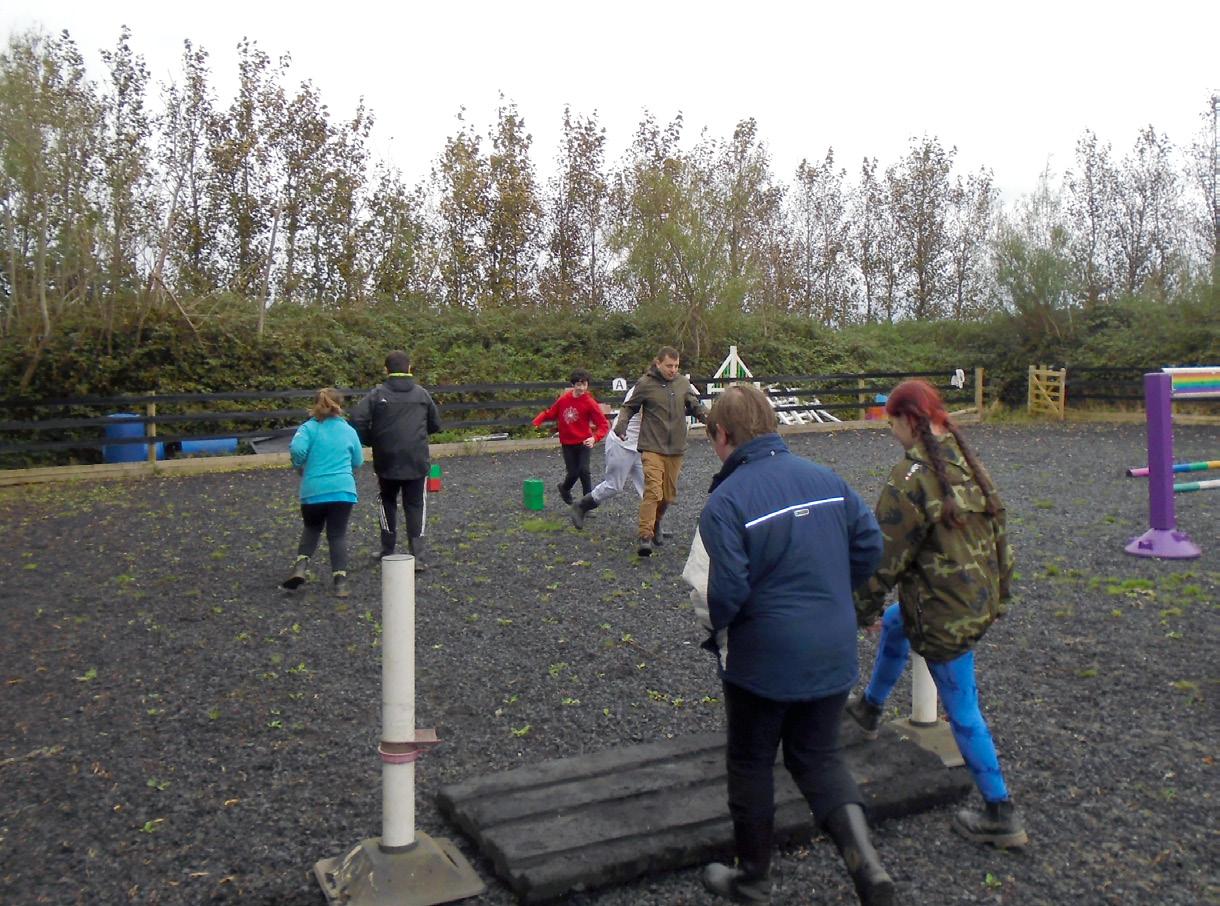
You can find out more about HUGS and how to support them at hugsfoundation.org.uk


Valley Vineyard
Students at Liskeard School have also been enjoying work experience every other week at Looe Valley Vineyard.
The vineyard was established in 2008 and they produce award-winning wines from the grapes grown in the Looe Valley. They are open for summer tours and tastings from May to October and you can buy their wine online.
“We do different jobs, depending on what time of year it is,” says Hope. “Sometimes we pick grapes, other times we clear up logs from the vineyard.” “Last time we helped pick apples and carry them in crates so they can be made into apple juice,” adds Willow. Other tasks the students have helped with include weeding and making bee traps out of balloons to lure wasps away from the grapes on the vine.
“We enjoy going there,” says Polly. “It’s pretty and things are always changing.”


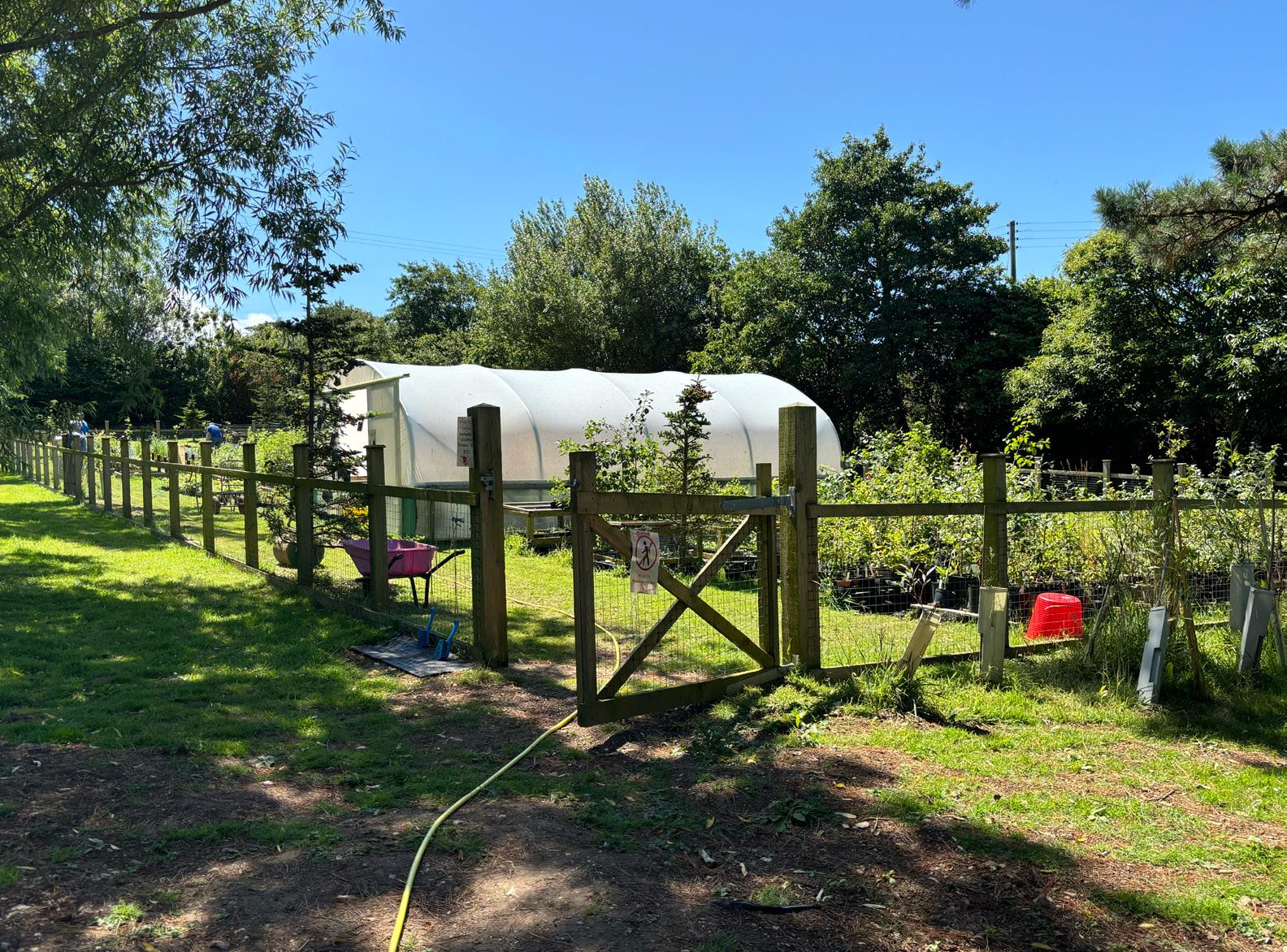

In this issue we’re taking a look at the fantastic opportunities available to SEND learners at the Kehelland Trust near Camborne.
Kehelland Horticultural Centre was established by Social Services in 1982 and in 2011 Kehelland Trust became an Independent Service Provider.
Today it is renowned for its beautiful site and produce and the wonderful volunteer and education opportunities it provides, particularly for young people with Special Educational Needs and / or Disabilities.
Kehelland College provides a specialist education course for young adults aged 16-24 who have an EHCP – over three years, learners are supported in employability and independent living skills and given support to explore different career options.
In their first year, learners try new things such as cooking different meals, developing cooking skills and safety, accessing public transport, and other units designed to build up independence.
In their second year, the students build on these independent living skills and also get the chance to pick an independent enterprise project that they develop, and then sell. These opportunities might involve working in the shop, or at the regular Kehelland market stall in nearby Camborne, for example and gives learners the chance to gain teamwork skills and learn useful things such as how to dress for the job they are doing, and how to communicate in the workplace.
By year three, learners can have the opportunity to head out into work experience roles in local businesses as well as continuing their work in the classroom. They also get the chance to learn skills including how to apply for a job and interview skills.
Ashlee explained that she particularly loved learning skills in the kitchen and doing outdoor work experience, making hanging baskets.
Harvey was keen to learn about taking photos. He wanted to share pictures of the amazing vegetables that the learners grow, the flowers in the fields as well as the students enjoying their daily lessons.
Many students, including Aaron and Henry, loved the natural environment, including the birds and wildlife they get to see around Kehelland.
George meanwhile loved the Fit 2 Wiggle exercises, kickboxing and yoga classes and trips to places such as Paradise Park. He has recently started his work experience with Camborne Town Council and is enjoying working outdoors looking after the local parks and gardens.
“We’re very lucky to have these beautiful surroundings here at Kehelland,” says Cat Allen, Senior Education Support Worker: Employability & Progression at Kehelland College. “The staff and students love it and there is a very happy and relaxed atmosphere here, everyone feels very safe and calm.
“What’s also fantastic is the number of new opportunities for work experience that are opening up. Learners now have the chance to get work placements at a good variety of places including Burncoose Nurseries, Truro Cathedral, Paradise Park and the Cornwall Seal Sanctuary. We always welcome employers who can support us with these placements, it makes such a huge difference to the learners.”
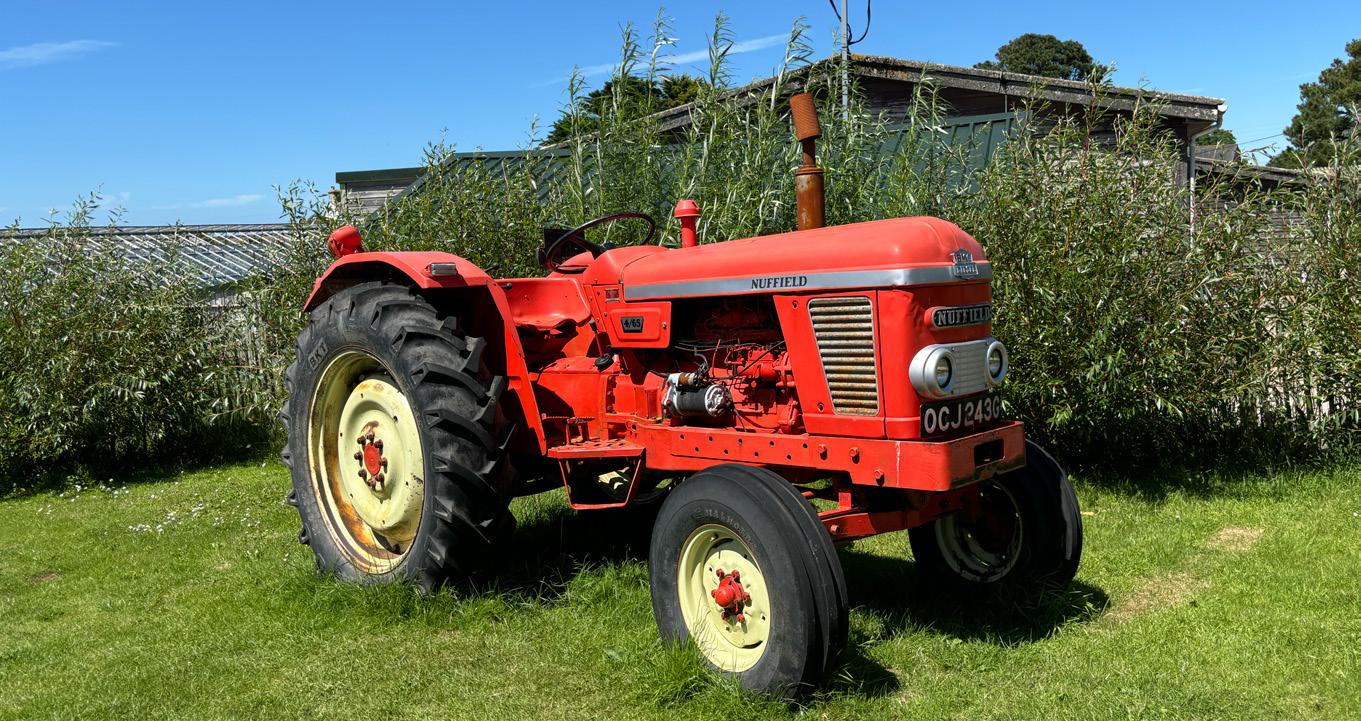


From a placement at the beautiful National Trust Cothele House, to working with animals at Paradise Park. Find out more about the learners enjoying supported internships around Cornwall
Supported interns at Newquay Orchard, Paradise Park, National Trust Cotehele and the Co-op in Launceston share their experiences

Shania, Supported Intern at Paradise Park, Hayle “Cornwall College found this placement for me as I have always wanted to work with animals,” says Shania. “Every day I put fresh bedding down, put out the food and do health checks on the animals. I work with the donkeys, sheep, goats, guinea pigs and rabbits. There are instructions on what needs to be done each day.
“Shania and our interns generally are a massive, massive help,” says Becky Waite, Zookeeper at Paradise Park. “They interact really well with us and the public as well. It’s great for us to be able to give them tasks to do and it’s wonderful to see how much they get out of it and enjoy their work. The interns are generally in charge of the farm with a zookeeper there to be with them in case anything unusual comes up. They have a clear routine and tasks to do. Occasionally they also come out to help feed the lorikeets and see the penguins as a treat. They are very much part of the team and it’s good fun, so if anyone is considering a placement like this I would say go for it, give it a go!”
Glynn, Food & Beverages Assistant at The Barn Cafe, NT Cotehele

“I came to work at this job after helping in another cafe in Okehampton,” says Glynn. “The sorts of jobs include helping with the washing up and loading the dishwasher which is quite fun actually. I sometimes help to prepare food and take food out to customers. I pack up the trays and wipe down the tables. I’ve actually just started a bit of tutoring to help when I’m talking to the customers too. When the customers are happy, you’re happy too and the customers come back.
The team here have been understanding about my disabilities, which not everyone always has. They’ve always helped me out when I’ve needed it. I really enjoy working here, and it also helps out the National Trust.”
“Having Glynn working here has been an absolute delight,” says Richard Kendrick Crawshaw Food & Beverages Manager at NT Cotehele. “He’s always on time, polite, he listens and
he’s always willing to learn. He’s completed his Food Health Level 2 qualification and Allergens Training so he has those skills as well as being really polite and helpful to customers.”

Matthew, supported intern at the Heart & Soul Cafe at Newquay Orchard
Matthew explains that he loves working in the cafe with Ben and the team. His favourite job is the washing up, and he also puts the flowers together, sorts out the vegetables that are grown at the Orchard and puts the cutlery away. Matthew also helps to set up the cafe in the mornings as well as offering very friendly customer service.”
“It was scary at first if I’m honest, because it’s not been something we’ve done before,” says Ben Southgate, Heart & Soul Cafe Manager at Newquay Orchard.”But it’s been so rewarding having someone who is just so happy to be here and so keen to do stuff. He listens, and he’s just been a joy to have around. He’s just raised all of us up and we’ve all enjoyed having him as part of the team.
“We’ve broken the day up into tasks that he enjoys. But part of working is that we all have to do some things we don’t want to do so there’s a mix of tasks and we encourage and support him through the day. For us the most important thing was ensuring there was a base skill set within the team and that has allowed us to bring in supported interns, which was a goal for us from the outset.”
David, supported intern at Co-op Launceston
“I chose to do an internship at the Co-op because you get to be around people, so it’s good for building social skills,” says David. “The kind of work I do is stock rotation, helping customers around the shop as well as ensuring recycling cages are put in the right place. Although it seems really contradictory for someone who is autistic, I really enjoy socialising and helping people to find what they need is really rewarding to me. I’ve really enjoyed my placement here.”
“Having David working with us as been beneficial in many ways, including his help with our deliveries and shelf stacking and other tasks,” says Liz Smith, team leader at the Co-op Launceston.”He’s very pleasant to work with and very chatty. Customers are always commenting on how helpful he is. He knows he can come to us if he needs any help and we like to make sure he really feels part of the team.”
Glynn, Matthew, David and Shania shared their experiences as supported interns in videos produced by Access Cornwall for the Cornwall Opportunities website. You can watch them and find more resources at www.cornwall-opportunities.co.uk/ supported-employment-and-internships/





If you would like to find out more about offering valuable work opportunities and experience to SEND students in Cornwall, join the Diversity to Thrive network today.
You can email ebp@cornwall.gov.uk or click on this link to sign up to the Diversity to Thrive newsletter.
Thanks to Perran Tremewan of Cornwall Rural Community Charity for photographs of the Newquay Orchard Community to Thrive event.




